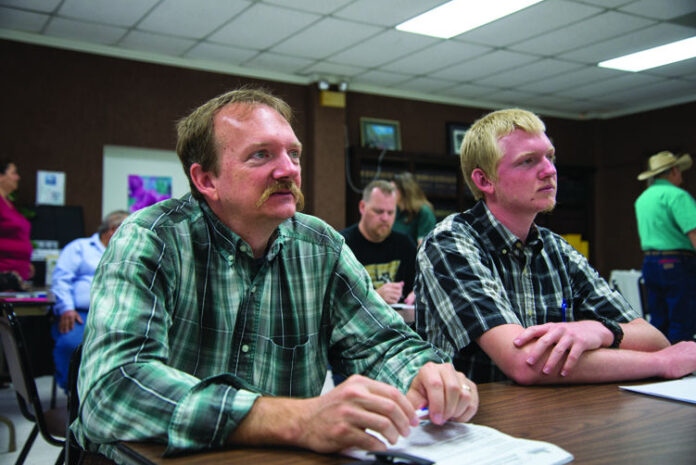RAYMONDVILLE — Sherry Salazar hopes her daughters learned about growing chemical-free vegetables for their family’s backyard garden.
Yesterday, the Texas-Mexico Border Coalition held a workshop here to teach local residents like the Salazar family how to improve their methods of small-scale farming.
The half-day seminar featured experts as part of a series of events planned for the Rio Grande Valley, with the next set for Harlingen April 21.
“I hope more people and more families can start growing their own produce and eventually scale up their production to grow their own food, to produce enough to make an income,” said Aisha Cruz-Reyes, project director at the Texas-Mexico Border Coalition in San Isidro.
Experts taught about 15 area residents how to better care for soil and build high tunnels, similar to greenhouses.
Gabriel Cavazos taught residents about no-till planting and other ways to care for soil.
“It’s tricky — it’s not easy,” said Cavazos, an agronomist with the Natural Resource Conservation Center. “We want to protect our soil.”
Cavazos urged small-scale farmers to use roller crimpers in their garden.
More conventional methods such as discing rob the soil of nutrients, Cavazos said.
“If you disc, you deplete organic matter,” Cavazos said. “We want to feed out soil. It takes years, but your nutrient cycle starts working like Mother Nature intended.”
Through agencies such as the U.S. Department of Agriculture, residents can use loans to expand their operations and build high tunnels to extend their growing seasons.
Cruz Salinas, with the University of Texas-Rio Grande Valley, showed residents how he built a high tunnel for $3,200.
Every week, under a polyethylene cover, Salinas harvests as much as 50 to 75 pounds of tomatoes and other crops.
In the audience at the Reber Memorial Library, Salazar said she wanted to teach her daughters Amber and Melissa about self-sustainable living.
“We never know what the future’s going to be,” said Salazar, a housewife. “Kids are not taught how to really survive. They should know their connection with our planet.”
Two years ago, she began turning her backyard into a garden to help feed her family.
“I’m loving it,” she said. “It’s the entire backyard. I want to be able to provide for my family more nutritious food — knowing what’s in it.”
Residents like Debra Rodriguez are new to small-scale farming.
Two weeks ago, she began tending her seven-foot by 20-foot garden, where she grows squash, poblano and chili peppers, watermelon and cantaloupe on her three-acre ranch in the Raymondville area.
But she turned to the experts to learn how to expand her garden into a half-acre plot.
“I’m thinking about growing on a larger scale,” said Rodriguez, who planted her garden after retiring from a local prison. “I want to get knowledge of planning fruits and vegetables and learn about the soil.”
Brian Schalk brought his son Caleb to learn how to boost production on the 30-foot by 180-foot plot on their Santa Monica spread named Grace Heritage Ranch.
“It’s a struggle for us,” said Schalk, who guides ranch tours to teach guests about self-sustainable living. “We’re always willing to learn more about our gardening and put things into practice. A big part of that is networking — meeting gardeners and people giving demonstrations, picking up tips on soil.”




